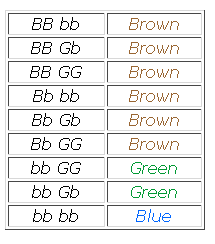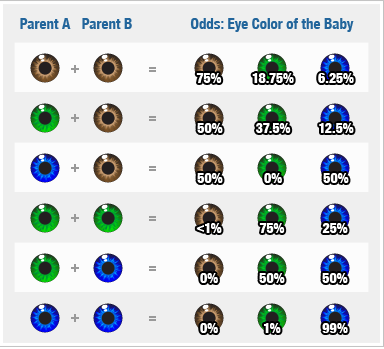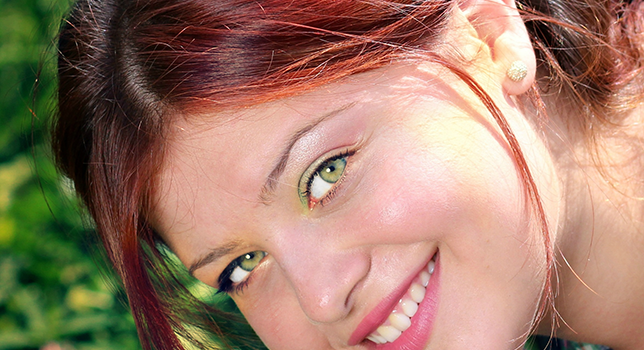Where’d the green-eyed monster come from?
If both parents have blue eyes, the children will have blue eyes. True or False?
False. It’s rare, but blue-eyed parents having brown-eyed children does happen. Why? Well, it’s complicated, but we can start by telling you that what you learnt at school, assuming you are of a certain age, is wrong.
The human eye comes in many different shades and intricate, unique iris patterns. Eye colour comes from a combination of two black and yellow pigments, melanin, in the iris. If you have no melanin in the front part of your iris, you have blue eyes. An increasing proportion of the yellow melanin, in combination with the black melanin, results in shades of colours between brown and blue, including green, grey and hazel.
Brown is the most frequent eye colour worldwide.
Mix it up
It was originally thought that eye colour was a simple Mendelian trait, that it was determined by a single gene. But modern science has shown that eye colour is not at all that simple.
Eye colour is a polygenic trait; it is determined by multiple genes and the interactions between them. This is what makes it possible for two blue-eyed parents to have brown-eyed children. There is evidence that up to 16 genes can influence eye colour; the two most important genes are OCA2 and HERC2.
In the simplest models of eye colour, there are two genes involved. For each gene, we inherit two copies, one from our mother and one from our father. (This model is too simple to explain a lot of things, but it will suit our purposes.)
Why are our kids’ eyes different colours?
Let’s look at why a blue-eyed parent (dad) and a brown-eyed parent (mum) and can have brown, green, and blue-eyed children.
 For gene 1, OCA2, there are two possibilities: brown or blue. The brown version of gene 1 is dominant over the blue one. Dominant means that if at least 1 of your two copies is brown (Bb), then you will have brown eyes. Geneticists represent the different versions of the eye colour gene as B for brown and b for blue (the capital letter is the dominant, the lowercase, recessive). So brown eyes are either Bb or BB and blue eyes are bb.
For gene 1, OCA2, there are two possibilities: brown or blue. The brown version of gene 1 is dominant over the blue one. Dominant means that if at least 1 of your two copies is brown (Bb), then you will have brown eyes. Geneticists represent the different versions of the eye colour gene as B for brown and b for blue (the capital letter is the dominant, the lowercase, recessive). So brown eyes are either Bb or BB and blue eyes are bb.
For gene 2, there are two possibilities, green or blue. Green is dominant over blue. Green eyes can be GG, or Gb, while blue eyes are bb. Brown is dominant over green, so if you have a B version of gene 1 and a G version of gene 2, you will have brown eyes.
The possible gene combinations that can give you brown, green, or blue eyes are shown in the chart.
Back to the green or blue-eyed children. Dad can only be bb bb as he has blue eyes. Since mum has brown eyes, she could have any of six different possibilities. But since they have brown-eyed, green-eyed and blue-eyed children, the most likely possibility is that mum is Bb Gb, meaning she has brown eyes but carries genes for both blue and green eyes.
What colour will your baby’s eyes be?
 How eye colour is inherited is far more complicated than what was thought back in the day.
How eye colour is inherited is far more complicated than what was thought back in the day.
Generally though, it’s far more likely for two brown-eyed parents to have a blue-eyed child than for two blue-eyed parents to have a brown-eyed child. This is because the generally less dominant blue-eyed trait can be passed along by brown-eyed people until the genes for the lighter eye colour happen to match up, possibly many generations later.
So, to try and clarify things, let’s think about this situation. Someone with brown eyes may be carrying one blue allele and one brown allele, so a brown-eyed mother and a blue-eyed father could give birth to a blue-eyed child. Now mix in a third green allele, which is dominant to blue, but recessive to brown. If the brown-eyed mother carried the green allele (bG), she could pass the green allele on 50% of the time, so when married up with the father’s blue allele, they could have a green-eyed child.
Eye colour is much more complicated than our explanation here, and involves genes that determine the amount of pigment in your eyes, as well as genes that can modify even dominant alleles, but I hope it clears things up for you.
For more information, this site is very helpful.
If you have or any other questions about eye colour or eyes in general, ask our Newmarket optometrists or our optometrist in Henderson. They are pretty clued up on all things related to eyes and optometry.

